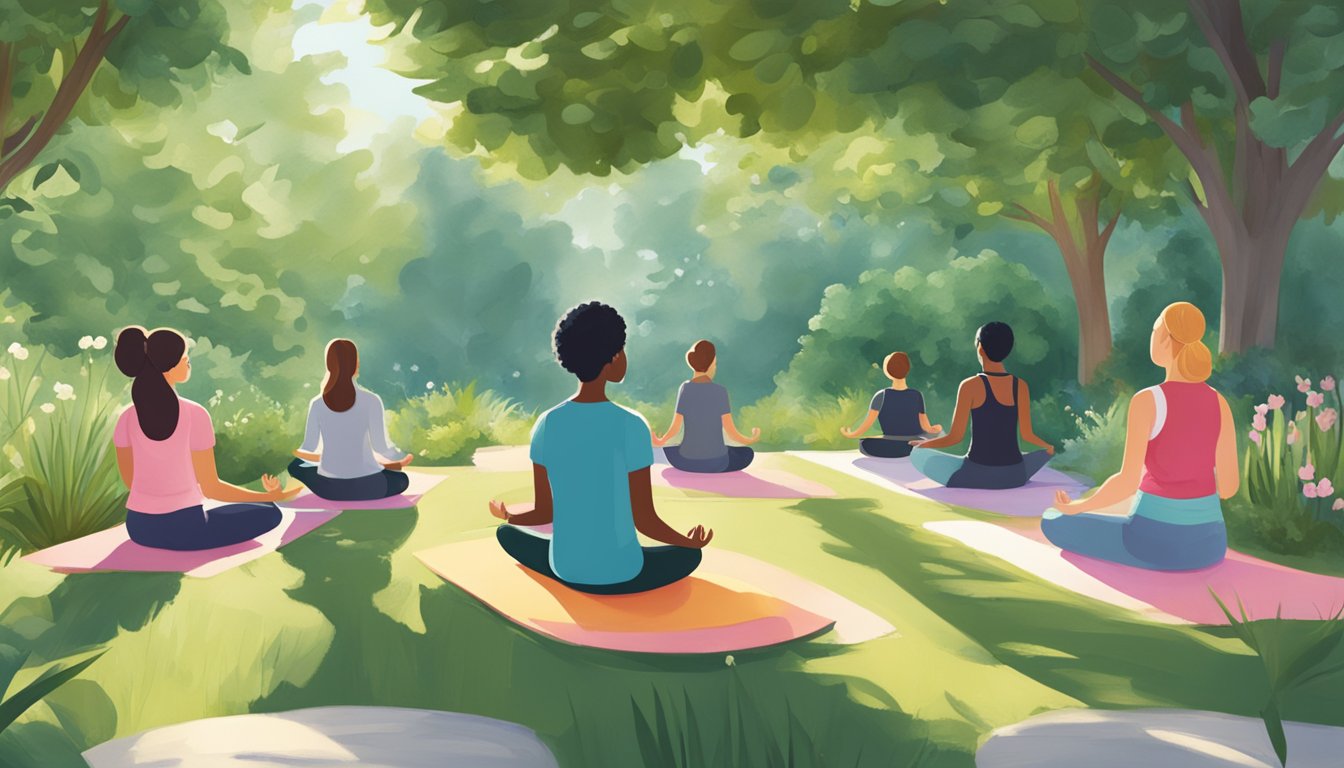What to Expect at a Mindfulness Retreat: Your Ultimate Guide
If you’re considering attending a mindfulness retreat, it’s natural to have some questions about what to expect. A mindfulness retreat is an opportunity to take a break from the stresses of daily life and focus on cultivating a greater sense of awareness and inner peace.
In this article, I’ll share some insights into what you can expect from attending a mindfulness retreat, including what to expect at the retreat centre, the mindfulness and meditation practices you’ll engage in, and how to integrate the experience into your daily life.

- Understanding Mindfulness Retreats:
Mindfulness retreats are designed to provide a peaceful and supportive environment for participants to deepen their mindfulness practice. They typically involve periods of silence, meditation, and mindful movement, as well as group discussions and teachings on mindfulness and related topics. While mindfulness retreats can vary in length and format, they all share the common goal of helping participants to cultivate greater awareness and presence in the present moment.
- Preparing for the Retreat:
Before attending a mindfulness retreat, it’s important to take some time to prepare yourself mentally and emotionally. This might involve setting an intention for the retreat, letting go of expectations, and making any necessary arrangements to ensure that you can fully immerse yourself in the experience. It’s also important to be open to the unexpected and to approach the retreat with a sense of curiosity and willingness to learn.
Key Takeaways
- A mindfulness retreat is an opportunity to take a break from daily life and cultivate greater awareness and inner peace.
- Mindfulness retreats typically involve periods of silence, meditation, and mindful movement, as well as group discussions and teachings on mindfulness.
- To prepare for a mindfulness retreat, it’s important to set an intention, let go of expectations, and approach the experience with openness and curiosity.
Understanding Mindfulness Retreats
The Purpose of Retreats
Mindfulness retreats are designed to provide an opportunity for individuals to take a break from the hustle and bustle of everyday life and focus on their mental and emotional well-being. The purpose of mindfulness retreats is to help individuals develop a greater sense of self-awareness, learn how to be more present in the moment, and cultivate a deeper sense of inner peace and calm.
One of the main goals of mindfulness retreats is to help individuals develop a regular meditation practice. Meditation is a powerful tool for reducing stress and anxiety, and can help individuals develop a greater sense of focus and clarity. At a mindfulness retreat, participants will have the opportunity to learn different meditation techniques and practice them in a supportive environment.
Different Types of Retreats
There are many different types of mindfulness retreats available, each with its unique focus and approach. Some retreats may focus on a particular type of meditation, such as Vipassana or Zen meditation, while others may incorporate yoga or other mindfulness practices.
Some mindfulness retreats are designed to be silent retreats, where participants are encouraged to remain in silence for the duration of the retreat. This can be a powerful way to cultivate a greater sense of inner peace and stillness, and can help individuals develop a deeper connection with themselves and their surroundings.
Other mindfulness retreats may focus on community building and social connection. These retreats may include group activities, such as group meditations or discussions, and provide opportunities for participants to connect with others who share similar interests and goals.
Overall, mindfulness retreats are a powerful way to cultivate a greater sense of inner peace, develop a regular meditation practice, and connect with others who share similar interests and goals.
Preparing for the Retreat
Before attending a mindfulness retreat, it is essential to prepare both physically and mentally. Here are some tips to help you prepare for a successful retreat.
What to Pack
When packing for a mindfulness retreat, it is important to keep in mind that the focus of the retreat is on inner reflection and growth. Therefore, it is recommended to pack comfortable clothing that allows for ease of movement and promotes relaxation. Loose-fitting clothing made from natural fibers such as cotton or linen is ideal. It is also recommended to bring layers as the temperature can vary throughout the day.
Other items to consider packing include a yoga mat, cushion, or blanket for meditation sessions. It is also recommended to bring a journal for reflection and note-taking, as well as any necessary toiletries and medication.
Setting Intentions
Setting intentions before attending a mindfulness retreat can help to focus your mind and create a sense of purpose. Take some time to reflect on what you hope to gain from the retreat and set an intention that aligns with your goals. Some common intentions include cultivating inner peace, reducing stress, or developing greater self-awareness.
Mental Preparation
Attending a mindfulness retreat can be a transformative experience, but it can also be challenging. It is important to approach the retreat with an open mind and realistic expectations. Understand that the retreat may bring up difficult emotions or physical discomfort, but trust that these experiences are a natural part of the process.
Mental preparation can also involve practicing mindfulness in your daily life leading up to the retreat. This can include taking moments throughout the day to focus on your breath or engaging in mindful movement practices such as yoga or tai chi.
By taking the time to prepare for a mindfulness retreat, you can set yourself up for a more meaningful and transformative experience. Remember to approach the retreat with an open mind and a willingness to learn and grow.
What to Expect at the Retreat Centre

If you are planning to attend a mindfulness retreat, it is important to know what to expect at the retreat centre. Here are some key aspects to keep in mind:
Accommodation and Meals
Most retreat centres provide shared accommodation, which means you will be sharing a room with other participants. The rooms are usually basic but comfortable, with a bed, a desk, and a chair. Some centres offer private rooms for an additional fee.
Meals are usually vegetarian or vegan, and they are served in a communal dining area. If you have any dietary restrictions or allergies, make sure to inform the retreat centre in advance so that they can make arrangements for you.
Daily Schedule
The daily schedule at a mindfulness retreat is structured to provide a balance of meditation, mindfulness practices, and free time. The schedule typically includes early morning meditation, followed by breakfast, and then a series of mindfulness practices and teachings throughout the day. There are also periods of free time for personal reflection and relaxation.
Rules and Etiquette
Mindfulness retreats are usually conducted in silence, which means that participants are expected to refrain from talking to each other during the retreat. This helps to create a peaceful and meditative environment. The retreat centre will also have its own set of rules and guidelines that all participants are expected to follow. These may include rules around the use of technology, smoking, and alcohol.
In terms of etiquette, it is important to be respectful and considerate of others at all times. This includes being mindful of noise levels, keeping common areas clean and tidy, and respecting personal space.
Overall, attending a mindfulness retreat can be a transformative experience that allows you to deepen your mindfulness practice and connect with like-minded individuals. By knowing what to expect at the retreat centre, you can ensure that you are fully prepared for the experience and can make the most of your time there.
Mindfulness and Meditation Practices
At a mindfulness retreat, you can expect to engage in various meditation and mindfulness practices that will help you cultivate inner peace and awareness. In this section, I will discuss the different practices you can expect to participate in during your retreat.
Guided Meditation Sessions
Guided meditation sessions are an excellent way to start your mindfulness practice. During these sessions, a meditation teacher will guide you through different meditation techniques, such as breath awareness, body scan, and loving-kindness meditation. These sessions are usually held in a group setting, and you will be encouraged to ask questions and share your experience with others.
Mindful Eating and Walking
Mindful eating and walking are two practices that help you connect with your body and the present moment. During mindful eating, you will be encouraged to eat your meals slowly and mindfully, paying attention to the taste, texture, and smell of the food. Mindful walking involves walking slowly and mindfully, paying attention to the sensations in your feet, legs, and body as you move.
Solo and Silent Meditation
Solo and silent meditation are practices that help you cultivate inner stillness and awareness. During these practices, you will be encouraged to sit in silence and observe your thoughts, emotions, and sensations without judgment. These practices can be challenging, especially if you are new to meditation, but they are essential for developing mindfulness and inner peace.
Overall, the meditation and mindfulness practices you can expect to engage in during a mindfulness retreat are designed to help you cultivate inner peace and awareness. By participating in these practices, you can learn to live more mindfully and find greater happiness and fulfilment in your life.
Integrating the Experience
After attending a mindfulness retreat, it is essential to integrate the experience into your daily life to reap the full benefits. Here are some tips on how to integrate the mindfulness practices you learned during the retreat into your daily routine.
Post-Retreat Support
After the retreat, it is essential to have support to help you integrate the mindfulness practices into your daily routine. You can join a mindfulness group or find a mindfulness coach to help you stay on track. You can also continue your practice by attending regular meditation sessions.
Applying Mindfulness in Daily Life
One way to apply mindfulness in daily life is to focus on your breath. Take a few deep breaths before starting a task, and then take a few more deep breaths when you finish the task. This will help you stay focused and present in the moment.
Another way to apply mindfulness in daily life is to practice mindful listening. When someone is speaking to you, give them your full attention and listen without judgment. This will help you build better relationships and improve communication.
Mindfulness can also help you manage stress and improve your mental health. Take a few minutes each day to practice mindfulness meditation. This will help you feel more relaxed and calm.
Incorporating mindfulness practices into your daily routine can help you experience personal growth, tranquility, and inner peace. Remember to be patient with yourself and take small steps towards integrating mindfulness into your daily life.
Frequently Asked Questions
What activities take part during a mindfulness retreat?
Mindfulness retreats usually involve a variety of activities that are designed to help you cultivate awareness, presence, and insight.
These activities may include silent meditation, walking meditation, mindful movement practices like yoga or tai chi, group discussions, and talks by teachers.
The exact activities may vary depending on the type of retreat you attend, but most retreats offer a balance of sitting and walking meditation.
How should one prepare for a silent retreat experience?
Preparing for a silent retreat involves both physical and mental preparation.
You may want to start by reducing your caffeine and sugar intake a few days before the retreat, as these substances can interfere with your ability to be present and focused.
It’s also a good idea to get plenty of rest and eat healthy, nourishing foods.
Mentally, you can prepare by setting an intention for the retreat and reminding yourself of why you’re attending. You may also want to familiarise yourself with the retreat schedule, so you know what to expect.
What are the typical daily schedules like at a Zen retreat?
Zen retreats typically involve a strict daily schedule that begins early in the morning and ends late at night.
The schedule usually includes several hours of sitting and walking meditation, as well as work periods, meals, and talks by teachers.
The exact schedule may vary depending on the retreat, but you can expect to spend most of your day in silence and engaged in mindfulness practices.
What attire is considered appropriate for a meditation retreat?
Comfortable, loose-fitting clothing is usually recommended for meditation retreats.
You’ll want to avoid anything too tight or restrictive, as well as clothing with bright colours or patterns that could be distracting to others.
It’s also a good idea to bring layers, as the temperature in meditation halls can vary.
Can beginners participate in meditation retreats, and what should they expect?
Absolutely! Many meditation retreats are designed specifically for beginners, and teachers are usually happy to offer guidance and support.
If you’re new to meditation, you can expect to receive instruction on basic techniques like breath awareness and body scan meditation.
You may also find that the retreat provides a supportive environment for deepening your practice.
Are there any specific etiquettes to follow while attending a mindfulness retreat?
Yes, most retreats have guidelines and rules that participants are expected to follow.
These may include things like maintaining silence, refraining from using electronic devices, and respecting the privacy and personal space of others.
It’s important to familiarise yourself with the specific guidelines of your retreat before attending, and to ask questions if you’re unsure about anything.






